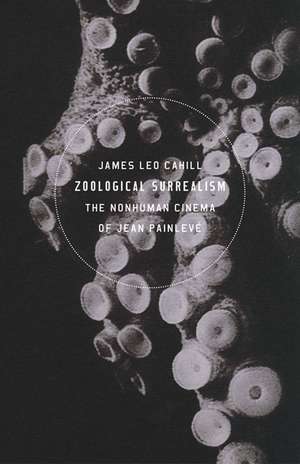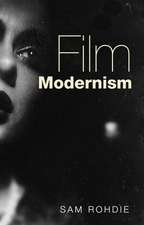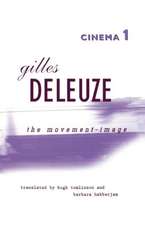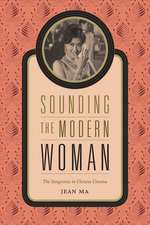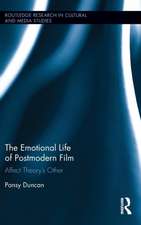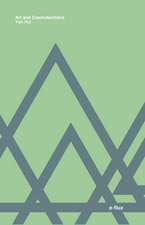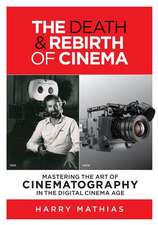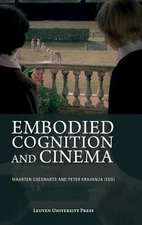Zoological Surrealism: The Nonhuman Cinema of Jean Painlevé
Autor James Leo Cahillen Limba Engleză Paperback – 19 feb 2019
An archive-based, in-depth analysis of the surreal nature and science movies of the pioneering French filmmaker Jean Painlevé
Before Jacques-Yves Cousteau, there was Jean Painlevé, a pioneering French scientific and nature filmmaker with a Surrealist’s eye. Creator of more than two hundred films, his studies of strange animal worlds doubled as critical reimaginations of humanity. With an unerring eye for the uncanny and unexpected, Painlevé and his assistant Geneviève Hamon captured oneiric octopuses, metamorphic crustaceans, erotic seahorses, mythic vampire bats, and insatiable predatory insects.
Zoological Surrealism draws from Painlevé’s early oeuvre to rethink the entangled histories of cinema, Surrealism, and scientific research in interwar France. Delving deeply into Painlevé’s archive, James Leo Cahill develops an account of “cinema’s Copernican vocation”—how it was used to forge new scientific discoveries while also displacing and critiquing anthropocentric viewpoints.
From Painlevé’s engagements with Sergei Eisenstein, Georges Franju, and competing Surrealists to the historiographical dimensions of Jean Vigo’s concept of social cinema, Zoological Surrealism taps never-before-examined sources to offer a completely original perspective on a cutting-edge filmmaker. The first extensive English-language study of Painlevé’s early films and their contexts, it adds important new insight to our understanding of film while also contributing to contemporary investigations of the increasingly surreal landscapes of climate change and ecological emergency.
Before Jacques-Yves Cousteau, there was Jean Painlevé, a pioneering French scientific and nature filmmaker with a Surrealist’s eye. Creator of more than two hundred films, his studies of strange animal worlds doubled as critical reimaginations of humanity. With an unerring eye for the uncanny and unexpected, Painlevé and his assistant Geneviève Hamon captured oneiric octopuses, metamorphic crustaceans, erotic seahorses, mythic vampire bats, and insatiable predatory insects.
Zoological Surrealism draws from Painlevé’s early oeuvre to rethink the entangled histories of cinema, Surrealism, and scientific research in interwar France. Delving deeply into Painlevé’s archive, James Leo Cahill develops an account of “cinema’s Copernican vocation”—how it was used to forge new scientific discoveries while also displacing and critiquing anthropocentric viewpoints.
From Painlevé’s engagements with Sergei Eisenstein, Georges Franju, and competing Surrealists to the historiographical dimensions of Jean Vigo’s concept of social cinema, Zoological Surrealism taps never-before-examined sources to offer a completely original perspective on a cutting-edge filmmaker. The first extensive English-language study of Painlevé’s early films and their contexts, it adds important new insight to our understanding of film while also contributing to contemporary investigations of the increasingly surreal landscapes of climate change and ecological emergency.
Preț: 188.02 lei
Nou
Puncte Express: 282
Preț estimativ în valută:
35.98€ • 38.47$ • 29.100£
35.98€ • 38.47$ • 29.100£
Carte disponibilă
Livrare economică 27 martie-10 aprilie
Livrare express 12-18 martie pentru 33.33 lei
Preluare comenzi: 021 569.72.76
Specificații
ISBN-13: 9781517902162
ISBN-10: 1517902169
Pagini: 384
Ilustrații: 72
Dimensiuni: 140 x 216 x 30 mm
Greutate: 0.57 kg
Editura: University of Minnesota Press
Colecția Univ Of Minnesota Press
ISBN-10: 1517902169
Pagini: 384
Ilustrații: 72
Dimensiuni: 140 x 216 x 30 mm
Greutate: 0.57 kg
Editura: University of Minnesota Press
Colecția Univ Of Minnesota Press
Notă biografică
James Leo Cahill is associate professor of cinema studies and French at the University of Toronto and general editor of Discourse: Journal for Theoretical Studies in Media and Culture.
Cuprins
Contents
Introduction: Cinema’s Copernican Vocation
1. Neozoological Dramas: Comparative Anatomy by Other Means
2. Metamorphoses: Crustaceans, the Coming of Sound, and Plasmatic Anthropomorphism
3. Amour Flou: The Seahorse and the Blur of Sex
4. Substitutes, Vectors, and the Circulatory Systems of Modernity: Dr. Normet’s Serum: Experimental Treatment of a Hemorrhage in a Dog and The Vampire
5. Carnivorous Cinema: Freshwater Assassins and The Blood of the Beasts
Conclusion: Unfinished Revolutions, Untimely Nature
Acknowledgments
Notes
Index
Introduction: Cinema’s Copernican Vocation
1. Neozoological Dramas: Comparative Anatomy by Other Means
2. Metamorphoses: Crustaceans, the Coming of Sound, and Plasmatic Anthropomorphism
3. Amour Flou: The Seahorse and the Blur of Sex
4. Substitutes, Vectors, and the Circulatory Systems of Modernity: Dr. Normet’s Serum: Experimental Treatment of a Hemorrhage in a Dog and The Vampire
5. Carnivorous Cinema: Freshwater Assassins and The Blood of the Beasts
Conclusion: Unfinished Revolutions, Untimely Nature
Acknowledgments
Notes
Index
Recenzii
"Reading Jean Painlevé’s archive, James Leo Cahill excavates an urgent nonhuman ethics made possible through film. Each chapter of this lively, meticulously researched, and beautifully written book reveals a complex vision of animals-for-themselves and animals as figures for a fraught political culture. The ‘cinematic nature’ of Painlevé’s world, as theorized by Cahill, unsettles any presumed separateness of human- and animal-being, even as it offers a vision of animal existence that is beyond human existence altogether."—Jennifer Fay, author of Inhospitable World: Cinema in the Time of the Anthropocene
"A remarkable study of Jean Painlevé’s cinematic attention to the marvels of animal life, James Leo Cahill’s study elegantly resolves the contradictions between intellectual biography and non-anthropocentric modes of inquiry. At once a focused critical biography and a wide-ranging study of organic systems thinking, Zoological Surrealism is alive with the intellectual ferment of the French 1930s. It is an essential text for any reader invested in the development of systems thinking, as well as in the history of experimental film, art, science, and thought."—Jonathan P. Eburne, author of Outsider Theory: Intellectual Histories of Unorthodox Ideas
"A remarkable study of Jean Painlevé’s cinematic attention to the marvels of animal life, James Leo Cahill’s study elegantly resolves the contradictions between intellectual biography and non-anthropocentric modes of inquiry. At once a focused critical biography and a wide-ranging study of organic systems thinking, Zoological Surrealism is alive with the intellectual ferment of the French 1930s. It is an essential text for any reader invested in the development of systems thinking, as well as in the history of experimental film, art, science, and thought."—Jonathan P. Eburne, author of Outsider Theory: Intellectual Histories of Unorthodox Ideas
